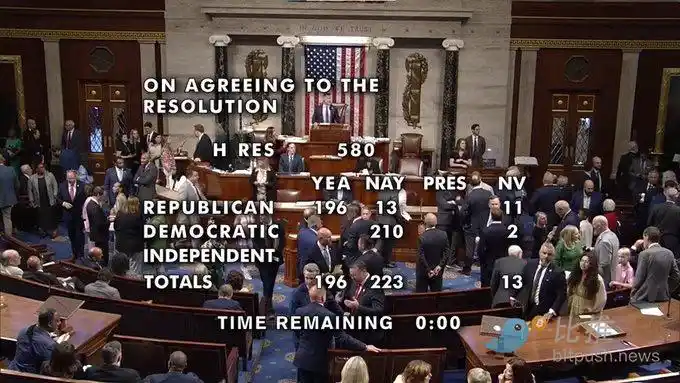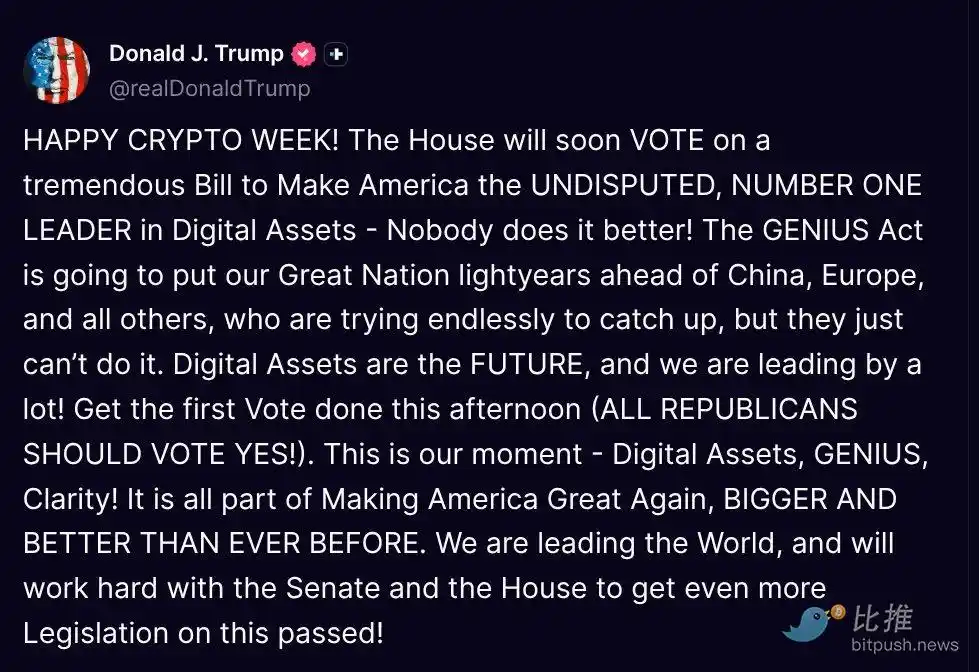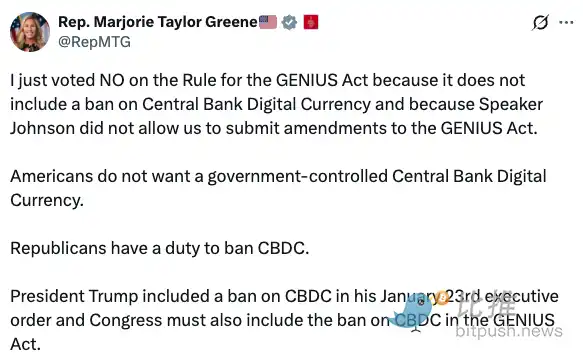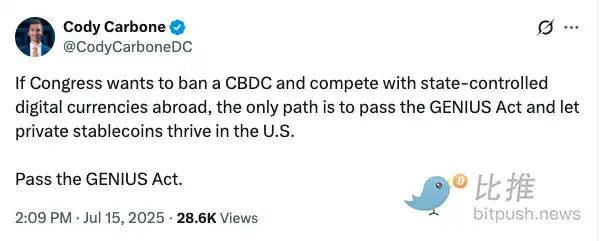「Crypto Week」 Setback: House Vote Goes Awry, Trump Steps in to Turn the Tide
The U.S. House of Representatives has scheduled a new round of procedural vote to take place at around 00:20 tomorrow morning Beijing time. If passed, this will be followed by related debates and a final vote.
Original Title: "House Cryptocurrency Bill Hits Roadblock, Trump Gets Impatient"
Original Source: Bitpush News
Bitpush Editorial Note: In less than an hour after the publication of this article, Trump posted on social media stating that he had met with 11 out of the 12 required lawmakers for the GENIUS Act, all of whom agreed to support the relevant bill the next morning. The U.S. House of Representatives has scheduled a procedural vote for tomorrow at around 00:20东八区. If passed, subsequent debates and a final vote will follow.
What was seen as a "highlight moment" for the cryptocurrency industry in Washington during "Crypto Week" suffered a setback on Tuesday when three cryptocurrency regulation bills backed by Trump unexpectedly "hit a snag" during a procedural vote.

The vote on Tuesday resulted in 196 in favor and 223 against. Thirteen Republican representatives joined Democrats in casting their dissenting votes, collectively preventing the procedural motion to proceed with the bill's debate and advancement.
This means that unless the House of Representatives passes the relevant procedural rules again, these industry-hopeful bills will not be able to enter substantive debate.
"Crypto Week" Vision: Trump Personally Oversees
Earlier this week, the mood in Washington's crypto industry was high, with widespread expectations that these bills would pass smoothly.
Trump himself also cheered for "Crypto Week" on his "Truth Social" platform, portraying it as a key step in making the United States the "undisputed, top leader" in the digital asset space. He called on all Republican representatives via social media to vote in favor, firmly believing that the "GENIUS Act will make our great nation leapfrog China, Europe, and all other countries by light years, as they endlessly try to catch up, but just can't do it."

The blocked cryptocurrency legislation "package" included three crucial bills for the industry:
· GENIUS Act: This bill on stablecoin regulation garnered some Democratic support in the Senate last month and successfully passed. It aims to provide a clear regulatory framework for stablecoins, seen as a key to unlocking broader institutional adoption.
· CLARITY Act: This bill aims to clarify the classification rules for digital assets, specifying which assets should be regulated by the U.S. Securities and Exchange Commission (SEC) as securities and which should be regulated by the Commodity Futures Trading Commission (CFTC) as commodities, to end the long-standing "regulatory gray area" plaguing the industry.
· Central Bank Digital Currency (CBDC) Ban Bill: This proposal aims to prohibit the Federal Reserve from creating a central bank digital currency, reflecting some lawmakers' concerns about government-controlled digital currency.
These bills are seen as a cornerstone for the United States to establish a comprehensive and predictable regulatory framework in the digital asset field, which could bring much-needed certainty to the market, attracting more capital and innovation.
"Dissent" Emerging Within the Republican Party
The most notable aspect of this vote was the "rebellion" by 13 Republican members. According to The Hill, several Republican representatives, including Marjorie Taylor Greene, Chip Roy, Michael Cloud, and Anna Paulina Luna, voted against the bill.
Marjorie Taylor Greene from Georgia publicly explained her stance on social media.
She stated that the "GENIUS Act" failed to include a ban on Central Bank Digital Currency (CBDC), and Speaker Johnson did not allow related amendments to be submitted. Greene emphasized that Trump had included a CBDC ban in his executive order on January 23, so Congress must also include it in the "GENIUS Act." She believes that "Americans do not need a government-controlled central bank digital currency."

House Speaker Johnson also found himself in a dilemma. After the failed vote, he mentioned that Republicans were "still having discussions, answering questions" to try to appease and win the support of these conservative members.
However, he also admitted that bundling all three bills together (especially the stablecoin bill already passed by the Senate and the CBDC ban bill demanded by hardliners) into one "big package" was impractical. A senior Republican member straightforwardly stated, "Bundling the votes will only derail these bills in the Senate." This statement reflects the strategic dilemma faced by the Republican leadership in balancing internal faction demands and ensuring legislative feasibility.
Subsequent Vote Suspense: Compromise or Deadlock?
After the news of the failed vote spread, stocks related to cryptocurrency saw a sharp decline: Stablecoin issuer Circle's stock price dropped over 7%, crypto exchange Coinbase fell over 4%, and digital asset company MARA Holdings' stock price also decreased by 2%.

House Speaker Johnson has announced his intention to hold a procedural vote on the Cryptocurrency Bill this Wednesday local time. The Louisiana Republican, upon leaving the Capitol, told reporters that the party is still "in continuous communication, addressing members' concerns," emphasizing that "these cryptocurrency bills are a shared priority of the White House, Senate, and House." According to Fox News, Trump himself is reportedly "angry" at the outcome of the vote and is in talks with relevant lawmakers.
Nevertheless, some industry analysts remain optimistic about the bill's future. TD Cowen policy analyst Jaret Seiberg stated in a client report, "We are likely to have another House vote on the rules tomorrow (Wednesday). If it doesn't happen tomorrow, this could be pushed to next week." Seiberg further expressed that he still expects the House to pass the "GENIUS Act" because "Trump is pushing for it to become law." He believes that even if members of the House "Freedom Caucus" oppose accepting the Senate version of the bill, they may ultimately make concessions at the President's request.

Cody Carbone, CEO of the Digital Chamber, also has confidence in the bill's eventual passage. He pointed out on social media that the best way to address the ban on CBDCs is through the "GENIUS Act": "If lawmakers are interested in banning CBDCs and competing with other country-issued digital currencies, the way to do so is through the ‘GENIUS Act’ and allowing the private stablecoin market to thrive in the United States."
This twist of events confirms one reality: in Washington, even an agenda pushed by the President can be defeated by delicate intra-party power dynamics. When technological innovation meets political gamesmanship, the "compliance journey" of cryptocurrency is destined to be anything but smooth.
Disclaimer: The content of this article solely reflects the author's opinion and does not represent the platform in any capacity. This article is not intended to serve as a reference for making investment decisions.
You may also like
DeFi Tops $300B TVL; Chainlink May Help Drive Institutional Adoption

Bitcoin May Remain Range-Bound Near $115,500–$116,500 as No Reversal Signals Emerge

Banks May Prefer On-Chain Bitcoin Collateral Over ETFs as Crypto-Backed Lending Gradually Grows

Dogecoin Breakout May Signal Renewed Bullish Momentum as Traders Eye $0.30

